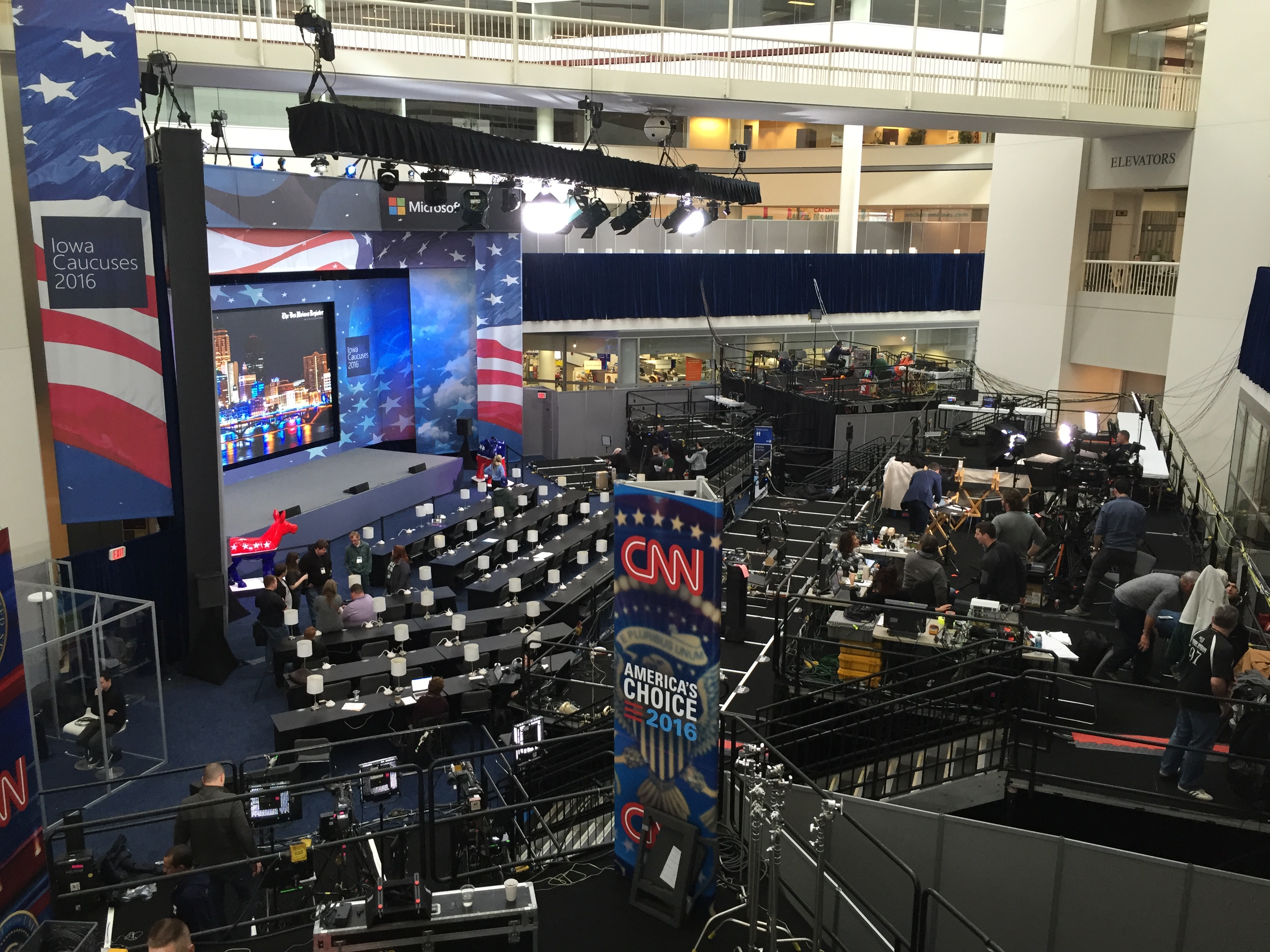
The Iowa Caucuses play a significant role in the American political system as the beginning of the candidate nomination process, but interest in the caucuses transcends U.S. borders.
Press from Sweden, Australia, Finland, Italy, Japan and many other foreign nations have descended on the Midwest state. These journalists cover the caucuses from a variety of angles based on the needs and demands of their audiences back home. Some were able to offer a foreign perspective on the caucus process and the candidates themselves.
Hungary
One such foreign journalist (pictured above) is Gosztonyi Zsolt, from Budapest, Hungary, who works for RTL Klub, his nation’s most watched television station. He says he will be doing a live report on the morning of the caucuses and continue reporting throughout the day in preparation for Tuesday’s edition of the news back home. His employers sent him to Iowa alone.
“I was doing some reporting in Los Angles for ten days, and then they said ‘Okay, the Iowa caucus is happening here, so you should stay one more week,’” Gosztonyi says.
Gosztonyi says he is impressed by the Iowa Caucus Media Center in the heart of Des Moines, where all credentialed journalists congregate and where many major news outlets send live reports. He says he thinks this will be the first time ever that a Hungarian audience will have one of their own reporting from the caucuses.
He says his biggest role will be explaining to Hungarian viewers what the caucuses are, how they work and their significance. The Hungarian people know Donald Trump and Hillary Clinton well, and to a lesser extent Bernie Sanders and Jeb Bush, but many of the other candidates are not well known to them, he says.
Gosztonyi says he has traveled all over the world as a reporter and is impressed by the professionalism on display in Iowa.
“This is my twentieth year of my journalist career, so it’s very interesting to be here and have first-hand experience on the caucuses,” Gosztonyi says.

Germany
Peter Kleim, a German journalist for RTL and n-tv, says this is the second caucus he has covered, having also attended four years ago. He attended a Bernie Sanders rally in Waterloo, Iowa on Sunday.
He says he and his German viewers are interested to see how the Democratic race turns out.
“In general the Germans are interested in finally hearing that the primaries are staring,” Kleim says. “Because they have heard so much now about Donald Trump and so on…for them it’s important that it’s the premiere, that it’s finally starting.”
Like Gosztonyi, Kleim says part of his role will be explaining the caucus process to his viewers, which he says is “very unheard of” in Germany. Kleim says Hillary Clinton is well known and popular in Germany, partly thanks to the popularity of her husband, former president Bill Clinton, who Kleim says appealed to Germany with his charisma and foreign policy.
Kleim says it’s less common in Germany for politicians to interact directly with voters, especially in public places like cafes.
“I like that you can come so close to the candidates, and how the Iowans interact with the politicians,” he says.
Italy
Italian journalist Riccardo Staglianò also attended the Bernie Sanders rally in Waterloo. Staglianò is a reporter for La Repubblica, a major Italian newspaper. He says this is is first time at the Iowa Caucuses personally, but his newspaper has been covering the event for decades.
Staglianò has set his sights on one candidate in particular.
“I’m here for Bernie Sanders,” Staglianò says. “There’s no other reason.”
Staglianò says he is planning to write a feature story for his newspaper’s magazine about Bernie Sanders. He says he hopes Italian audiences will be interested in reading about the progressive Sanders.
“From our perspective it’s kind of surprising that an old man can resonate so much with youngsters,” Staglianò says. “His recipe of being old and being able to get in sync with a much younger audience…I’d like to understand that kind of recipe. I’m afraid that in Italy you wouldn’t have such an old man resonate with people of 20.”
Japan
A Japanese journalist from The Yomiuri Shimbun, the world’s largest newspaper by circulation, says Japan is hoping for a U.S. President that will be tough on China.
“Japan and the United States are allies, so Japanese people are mostly interested in the candidates’ foreign policy,” the journalist says. “Because of the rapid Chinese rise, Japanese people want to know which candidates will be a tough President [toward] China.”
